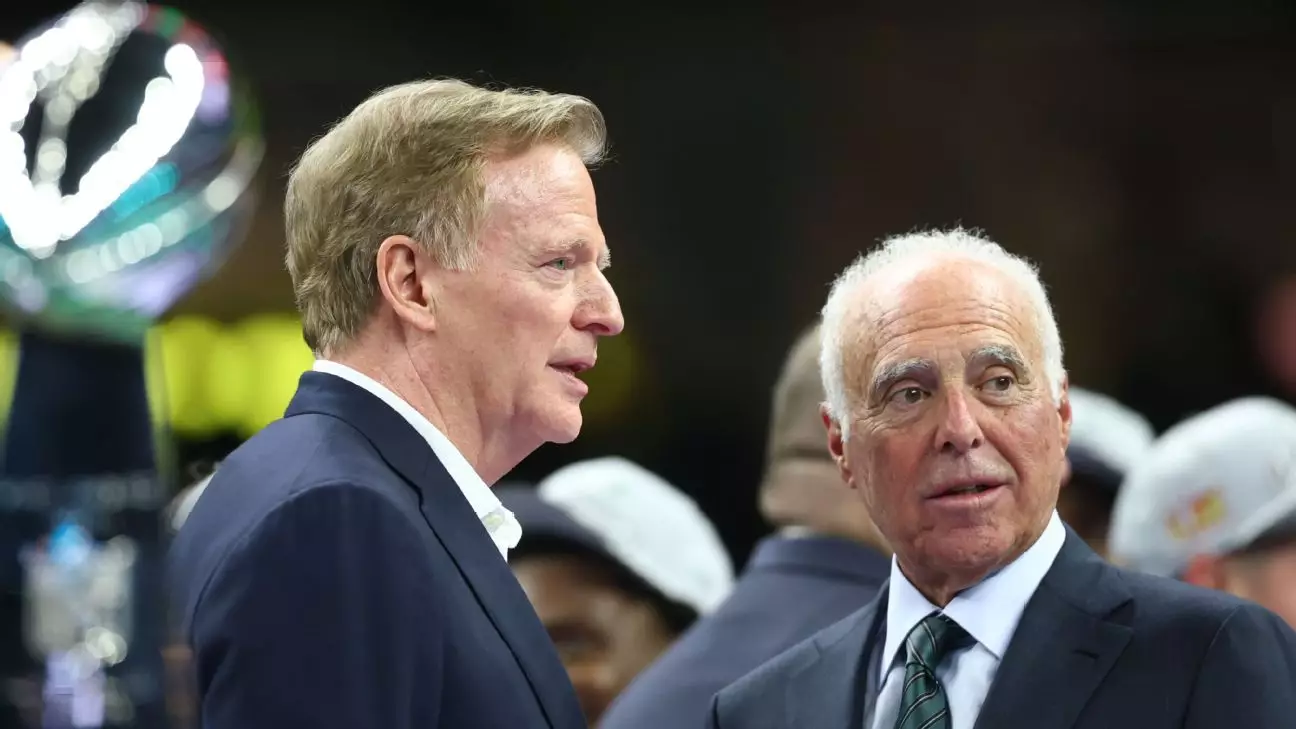In a league renowned for its theatrics, the recent debate surrounding the “tush push” play has escalated into a vivid clash of egos and ideologies among NFL owners and executives. This contentious discussion unfolded during the league’s meeting in Eagan, Minnesota, highlighting not just a battle over a strategic play, but also deeper issues regarding player safety, tradition, and the ever-evolving dynamics of entertainment in professional sports. The incident underscores the intersection of rigid institutional norms and the innovative spirit that often defines American football.
At the heart of this debate was Philadelphia Eagles owner Jeffrey Lurie, who passionately advocated for the continuation of the tush push. His fervor brings forth an important point: the need for adaptability within the league. How can an industry thrive if it remains averse to acquiring new strategies that enhance performance? Lurie’s argument, while bombastic and sometimes cringe-worthy—especially with an analogy likening the play to “a wet dream for a teenage boy”—is a reflection of a pivotal moment where creativity and competitive advantage collide with traditional sensibilities. Yet, the very act of using such crude metaphors in a professional setting underlines a concerning lack of decorum that can mar important conversations.
Gender Dynamics and Professionalism
One major takeaway from this debacle is the insufficient awareness regarding gender dynamics within the game’s highest chambers. Lurie’s offhand comment, criticized by NFL executive Troy Vincent, reveals an ongoing struggle for inclusivity in a league that predominantly features male decision-makers. Sonic dissonance ensued when women present in the room were subjected to such comments, which some might interpret as a lapse in judgment that highlights the need for greater sensitivity in today’s world. This incident should serve as a wake-up call, urging all stakeholders to foster an environment where professionalism is not dismissed, regardless of the competitive fervor.
It’s essential to understand that the NFL is not just a sports league; it’s an immense business that holds significant cultural sway. The jokes, the bravado, and the male-dominated culture often distract from the need for serious ideation around player safety and welfare. If the league intends to celebrate innovation while ensuring safety and inclusivity, the discourse must evolve. It’s not merely useful to weigh significant strategic decisions against entertainment value; one must consider the broader social implications of how these discussions unfold.
The Politics of Power in NFL Decision-Making
The power dynamics at play within this debate are as fascinating as the play itself. After Lurie’s impassioned appeal, one could feel the tension in the room when other owners weighed in. Dallas Cowboys owner Jerry Jones and Buffalo Bills owner Terry Pegula brought their voices to the discussion—a reminder that rivalries and alliances extend far beyond the football field. Pegula’s support for the ban despite his team’s success with the play conveys deeper political undercurrents: fostering competitive parity versus leveraging unique strategies for success. The division seen in the voting outcome—22 against 10—echoes a growing ideological split within the NFL, rooted in an aversion to change for fear of compromising player safety and competitive integrity.
Perhaps this political fracture within the NFL produces productive contention, leading to re-evaluations of practices and concepts that have become stale. However, it also poses an existential question: At what point does the drive to preserve tradition cross the line into stagnation? The failure to ban the tush push could indeed reflect a broader resistance to innovation that is reminiscent of other industries grappling with disruptive changes.
Amid this volatility, one cannot ignore the critical need for transparent dialogues that encompass a myriad of perspectives. As the NFL evolves, the conversations—or sometimes, the heated debates—will ultimately define the nature of the game in years to come. Instead of stifling creativity under the guise of tradition, perhaps it is time for the NFL to embrace a philosophy that encourages dialogue, making room for fresh insights while championing safety and inclusivity.


Leave a Reply